Brian Simmons, along with BroadStreet Publishing, claimed in early editions of the so-called ‘Passion Translation bible’, that he had ‘translated directly’ from the original text. For example, The Psalms: Poetry on Fire (2015) was said to have been ‘translated directly from the original Hebrew text’:
Likewise, the first edition of ‘Letters from Heaven by the Apostle Paul’ (2014) was claimed to have been translated ‘directly’ from the ‘original Greek and Aramaic texts’ by Simmons:
as was the first edition of Romans: Grace and Glory (2015):
raising first of all a question of logic:
How can a single letter from Paul have both ‘original’ Greek texts and ‘original’ Aramaic texts? Surely he must have written Romans in either one language or the other?
Simmons says that for the New Testament he used the Greek New Testament (Nestle-Aland, 27th ed.) as his base text, while incorporating ‘insights’ from the Syriac Peshitta (Syriac being an ancient dialectic of Aramaic 1):
It is normal for translators of Paul’s letters to make use of Latin, Syriac, Coptic and other early translations for a) deciding which of alternative readings of the Greek texts is more likely to be the original, and b) deciding which of alternative meanings of a Greek word, phrase or sentence is more likely to be correct.
To my knowledge, Simmons does not use the Peshitta for either of these scholarly purposes. Instead he gives the appearance, as marked by endnotes, of switching between translating from Greek and translating from ‘the Aramaic’ (identified as the Peshitta by the above statement about textual source materials). What is the logic of this? Does Simmons believe that Paul wrote some of his letter in Greek and some in Aramaic?
The second question raised is whether Simmons believes that it is possible that Paul wrote to the Romans in Aramaic. In a review of ‘Romans: Grace and Glory’, Lionel Windsor, Lecturer in New Testament and Greek at Moore College Sydney, wrote that ‘nobody’ thinks that Paul wrote Romans in Aramaic. If he had, it would not have been understood by many of the saints in Rome:
In fact, there do exist proponents (the best known being George Lamsa) of the view that the entire New Testament was written in Aramaic. The best known was George Lamsa, who was a member of the Church of the East, which has held this position as a matter of dogma. 2 What is Brian Simmons’ view? Does his switching from Greek to a supposed ‘original’ Aramaic text source perhaps indicate that he has been sufficiently influenced by ‘Aramaic primacy’ to have become unsure what language Paul wrote in?
Did Simmons actually translate from the Peshitta?
While these questions about the source text are of vital importance, an even more serious matter surfaced in March 2017 through a brief investigation I undertook of those occasional words, phrases, clauses and sentences that Simmons said he had translated from the ‘Aramaic’ (which I will henceforth refer to as the Syriac Peshitta on the basis of his web-site’s FAQs). It soon became apparent that most of the purported translations were incorrect. Then after an exchange on Facebook with Simmons about his ‘translation’ of Galatians 3.1, I realised that Simmons was almost certainly not translating from Syriac at all. Shortly afterwards, I was able to identify the main source of Simmons’ ‘translations’ from the Peshitta as being Victor Alexander’s ‘Aramaic Bible’, which purports to be an English translation of ancient Aramaic scriptures. Alexander is a film-maker, and does not appear to have any qualifications to translate ancient Syriac. There is reason to believe that his so-called translation is partly a work of his own imagination, making the Passion ‘Translation’ in turn wholly unreliable.
In what follows, I examine eight verses in the Passion Translation which contain an endnote claiming that translation has been made from the Peshitta, and which differ radically from usual translations. I begin with the two verses which I had opportunity to discuss with Brian Simmons himself.
Galatians 3.1
Ὦ ἀνόητοι Γαλάται, τίς ὑμᾶς ἐβάσκανεν, οἷς κατ’ ὀφθαλμοὺς Ἰησοῦς Χριστὸς προεγράφη ἐσταυρωμένος; (NA 28)
‘O foolish Galatians! Who has bewitched you? It was before your eyes that Jesus Christ was publicly portrayed as crucified.’ (ESV)
Simmons, Passion ‘Translation’:
Note b:
By referring to ‘this very unusual sentence’, Simmons clearly marks his endnote as applying to the last sentence of his rendering of Galatians 3.1: ‘Wasn’t he revealed to you as the Manifestation of Wisdom?’ He says that it ‘is translated from the Aramaic text’.
Is that true? Here is the Western UBS Peshitta text from dukrhana.com with Hebrew and Latin transliteration and three English translations by Etheridge (green), Murdock (navy), and Lamsa (purple):
The interested reader can go to Dukrhana, click on the ‘analyze’ link, and see that these English translations, which hardly differ at all from normal English translations of the Greek text, are faithful translations of the Syriac text. There is nothing in the Syriac text which corresponds to the final sentence of Simmons’ text. I drew attention to this anomaly on the ‘Passion Translation’ Facebook page in March 2017:
In reply, the page administrator seemed to assume that I had been looking at George Lamsa’s English translation of the Peshitta, and recommended as an alternative Victor Alexander’s so-called ‘translation’, which was at that time available online at v-a.com. Later that afternoon, Brian Simmons recommended two other English versions, namely those of Dave Bauscher, and Andrew Roth:
Why did Simmons not explain how he had derived his purported translation from the Syriac text? To encourage him to do so, I included that text in my response. Also, since he had directed me to three different English translations, I asked him whether any of the three supported his rendering:
In reply, Brian made no reference to the Syriac text, but directed me specifically to Alexander’s work:
Alexander’s translation of Galatians 3.1, however:
provides no support for Simmons’ translation, as I proceeded to point out:
but received no reply. Where did he get these words from? He says in note b that ‘the words, Manifestation of Wisdom’ can also be translated, ‘Artisan’ or ‘Fashioner’ or ‘Master Craftsman.’:
This sounds as if there are some actual Aramaic words which he is looking at. But what are they? And what sort of words would they be which could be translated ‘Manifestation of Wisdom’ on the one hand, and ‘Artisan; Fashioner; Master Craftsman’ on the other?
I also asked Simmons on Twitter to explain the source of his sentence:
but received no reply, and after asking a total of two further questions about Galatians 3.3 (here) and Galatians 3.19 (here), not impolitely it seems to me, and without receiving any reply, he blocked me:
Of the three translations of the Peshitta recommended by Simmons, the translators of at least two of them, namely Victor Alexander 3 and David Bauscher 4, hold to ‘Aramaic primacy’ for the entire New Testament. The web-site of the third version, translated by Andrew Roth, carries an article by the publisher, Baruch Ben Daniel, maintaining likewise that the New Testament ‘was written in Aramaic, Paul’s letters were also [sic] originally written in Aramaic.’ 5
Galatians 3.19
Τί οὖν ὁ νόμος; τῶν παραβάσεων χάριν προσετέθη, ἄχρις οὗ ἔλθῃ τὸ σπέρμα ᾧ ἐπήγγελται, διαταγεὶς δι’ ἀγγέλων ἐν χειρὶ μεσίτου. (NA 28)
‘What purpose then does the law serve? It was added because of transgressions, till the Seed should come to whom the promise was made; and it was appointed through angels by the hand of a mediator.’ (NKJV)
Simmons:
Here is a case where Simmons makes clear exactly which part of his so-called ‘translation’ he is claiming to derive from the Peshitta. According to endnote q, we should find Syriac words that mean literally ‘Joyous Expectation’.
Examination of the text, however, shows that the word in question is ܙܰܪܥܳܐ (zarᶜā), and its basic meaning is given by Jennings as ‘seed’, with metaphorical meanings of ‘race’, ‘family’, ‘offspring’:
Normal English versions of the Peshitta translate the word accordingly as ‘Seed’ (Etheridge), ‘seed’ (Murdock), or ‘descendant’ (Walters). Why does Simmons ‘translate’ it as ‘Joyous Expectation’?
This precise phrase (except in the plural) occurs in a footnote to this verse in Victor Alexander’s New Testament:
It occurred to me later that ‘joyous expectations’ does not in fact occupy the same place in Alexander’s sentence as it does in Simmons’. My initial reaction however, having found its origin, was to ask Simmons where Alexander in turn had derived it from:
Simmons, or at least someone speaking on behalf of the Passion Translation, believed that Alexander’s understanding of the meaning of the word would have come from his ‘perspective’ as a present day Aramaic speaker:
They thus, it seems to me, betrayed a lack of understanding of the translator’s task. Let us suppose, for sake of argument, that Alexander had in fact understood ܙܰܪܥܳܐ (zarᶜā) to mean ‘joyous expectation’. Perhaps the word had acquired a new meaning over the last 1600 or 1800 years since the Peshitta was translated from the Greek. People had been planting their seed and thinking with joyous expectation of the harvest to come, and begun to use the word to mean not only the seed but also the feeling that came with it. Would this then justify translating the word as it appears in the Peshitta as ‘joyous expectation’? Not at all, it seems to me. What matters is what the word meant at the time of authorship, not what it might mean now.
Simmons’ dependence on Alexander in Galatians
By this time I had embarked on an examination of the first ten verses in Galatians that Simmons claimed to have translated from the Peshitta. A total of six have deviations from the true meaning of the Peshitta which can be traced to Alexander’s work. A seventh has a deviation that may derive either from Lamsa or Alexander. I have summarised the analysis of all ten verses elsewhere and here just show those where there is clear dependence on Alexander. Red indicates a shared deviation from the Peshitta, and green a shared distinctive translation of the Peshitta. The headings are linked to a fuller analysis of each verse.
Galatians 1.4a
τοῦ δόντος ἑαυτὸν ὑπὲρ τῶν ἁμαρτιῶν ἡμῶν (NA 28)
‘who gave himself for our sins’ (ESV)
‘who gave himself for our sins’ (Walters)
‘who offered his soul as the sacrifice (*) for our sins’ (Simmons)
‘He who sacrificed himself (*) on behalf of our sins’ (Alexander)
with footnote:
‘Aramaic expression: “Gave his soul.”‘
Conclusion
It seems highly probable that Simmons has derived both the idea of sacrifice, and the substitution of ‘his soul’ for ‘himself’ (a defensible translation), from Alexander.
Galatians 2.10
μόνον τῶν πτωχῶν ἵνα μνημονεύωμεν, ὃ καὶ ἐσπούδασα αὐτὸ τοῦτο ποιῆσαι. (NA 28)
'Only, they asked us to remember the poor, the very thing I was eager to do.' (ESV)
'Their only concern was that we remember the poor, which was something I was already eager to do.' (Walters)
‘They simply requested one thing of me: that I would be devoted to the poor and needy, (*) which was the burden I was already carrying in my heart.’ (Simmons)
‘That we may devote ourselves to the needy alone, and I was at a loss as to why they did this.’ (Alexander)
Conclusion
Simmons’ ‘be devoted to’ has no basis in the Aramaic, but is found in Alexander’s work, which is likely therefore to be the origin of it.
Galatians 3.3
οὕτως ἀνόητοί ἐστε, ἐναρξάμενοι πνεύματι νῦν σαρκὶ ἐπιτελεῖσθε; (NA 28)
'Are you so foolish? Having begun with the Spirit, are you now ending with the flesh?' (RSV)
'Are you so foolish that, having begun with the Spirit you are now finishing with the flesh?' (Walters)
‘Your new life in the Anointed One began with the Holy Spirit giving you a new birth. Why then would you so foolishly turn from living in the Spirit to becoming slaves again to your flesh? (*) Do you really think you can bring yourself to maturity in the Anointed One without the Holy Spirit?’ (Simmons)
‘Did you become so foolish that while before, the Spirit abided in you, you have now become the slaves of the flesh?’ (Alexander)
Conclusion
Having found no justification for Simmons’ ‘becoming slaves again to’ in the Aramaic text, I conclude that it derives from Alexander’s ‘become the slaves of’.
Galatians 3.22
ἀλλὰ συνέκλεισεν ἡ γραφὴ τὰ πάντα ὑπὸ ἁμαρτίαν, ἵνα ἡ ἐπαγγελία ἐκ πίστεως Ἰησοῦ Χριστοῦ δοθῇ τοῖς πιστεύουσιν. (NA 28)
'But the Scripture imprisoned everything under sin, so that the promise by faith in Jesus Christ might be given to those who believe.' (ESV)
'But rather, Scripture confined everything under sin so that the promise made through the faithfulness of Jesus the Messiah might be given to those who believe.' (Walters)
‘But the Scriptures make it clear that since we were all under the power of sin, we needed Jesus! And he is the Savior who brings the kingdom realm (*) to those who believe.’ (Simmons)
‘Except, Scriptures comprised of everything that was under the power of sin,* so that the Kingdom that is the Faith in Eashoa Msheekha would be proffered to those who believed.’ (Alexander)
Conclusion
Since there is no justification for translating ܡܘܠܟܢܐ as ‘kingdom realm’, it seems certain that Simmons’ phrase comes from Alexander’s ‘Kingdom’.
Galatians 4.3
οὕτως καὶ ἡμεῖς, ὅτε ἦμεν νήπιοι, ὑπὸ τὰ στοιχεῖα τοῦ κόσμου ἤμεθα δεδουλωμένοι· (NA 28)
'Even so we, when we were children, were in bondage under the elements of the world.' (NKJV)
'So also when we were children, we were subjugated under the natural elements of the world.' (Walters)
‘So it is with us. When we were juveniles we were enslaved under the regulations and rituals of religion. (*)’ (Simmons)
‘Thus we also, while young we were under submission to the rituals of the world.’ (Alexander)
Conclusion
There is no justification for translating ܐܶܣܛܽܘܟ݁ܣܰܘܗ݈ܝ (ᵓesṭūkkəsaw) with ‘the regulations and rituals’ since the lexeme ܐܣܛܘܟܣܐ is simply a transliteration or loan word of the Greek στοιχεῖον, meaning ‘elements’, ‘fundamental principles’ or ‘elemental spirits’. I conclude therefore that Simmons has derived it from Alexander’s ‘the rituals’.
Romans 1.9
Before my examination of Galatians, I had looked at two verses in Romans, where Simmons had claimed to have translated from the Aramaic. I found that his rendering ‘the gift of the Spirit’ rather than ‘some spiritual gift’ in Romans 1.11 was in line with other translations of the Peshitta, and in accordance with the Syriac text.
In Romans 1.9, however:
μάρτυς γάρ μού ἐστιν ὁ θεός, ᾧ λατρεύω ἐν τῷ πνεύματί μου ἐν τῷ εὐαγγελίῳ τοῦ υἱοῦ αὐτοῦ, ὡς ἀδιαλείπτως μνείαν ὑμῶν ποιοῦμαι [NA 28]
‘For God is my witness, whom I serve with my spirit in the gospel of his Son, that without ceasing I mention you’ [ESV]
where Simmons had replace ‘gospel’ with ‘revelation’:
Etheridge and Murdock both have ‘gospel’:
What is more, the Syriac word ܐܶܘܰܢܓ݁ܶܠܺܝܳܘܢ – e)wang‘eliyawn – which appears with its prepositional prefix ܒ in the text above as ܒ݁ܶܐܘܰܢܓ݁ܶܠܺܝܳܘܢ , is clearly a loan-word from the Greek εὐαγγέλιον, meaning ‘good news, gospel’, as is confirmed by Syriac lexicons, including Jennings for example:
If Simmons were indeed translating from the Syriac as he claimed, and also knew Greek as he claimed, how could he have failed to recognise this as εὐαγγέλιον and translate accordingly? And from where did he get the rendering ‘revelation’? I wrote about Romans 1.9 three days before I discovered Simmons’s dependence on Alexander, so had no answer to the second question at the time:
When I discovered the Alexander connection part way through my examination of Galatians, I went back to see how Alexander had translated the earlier verses in Galatians, but neglected to do the same for Romans. Alexander subsequently removed the great bulk of his New Testament translation from his web-site. A blogger with an interest in Alexander’s work has now sent me the text of Romans 1 by email, and verse 9 reads:
Alexander also translated ܐܶܘܰܢܓ݁ܶܠܺܝܳܘܢ as ‘Revelation’ in Mark 1.1, which is still online:
He claimed that it was not a Greek loan-word, but rather had an Aramaic etymology, being formed from three words which he claimed meant ‘He reveals’:
I suspect that Alexander’s etymology is driven by his belief in Aramaic primacy, rather than drawn from an expertise in Syriac noun formation. I have found no support for his view in the lexicons.
There can be little doubt that Simmons took his rendering ‘revelation’ from Alexander, and did not translate it from the Syriac text.
Publisher’s partial retraction
On 24 March 2017, I wrote (pp. 11-14) to BroadStreet Publishing to:
a) explain why I did not believe Simmons had translated directly from the Peshitta as had been claimed;
b) present evidence of Simmons’ dependence on Alexander’s English translation;
c) show that Alexander’s translation was wholly unreliable.
On 27 July 2017, I received a reply (p. 10) from the Editorial Director, to say that they had taken my ‘feedback into consideration’, and had ‘implemented key
adjustments for the fall release of The Passion Translation’s New
Testament with Psalms, Proverbs, and Song of Songs’:
In the first edition, it was still claimed that Simmons had translated from Hebrew, Greek and Aramaic texts, but no longer ‘directly’ from these texts: 6
In the second edition (2018), the claim of translation from Hebrew, Greek and Aramaic was removed altogether:
On the other hand, the publications are still being referred to as ‘The Passion Translation‘, which implies a source language other than English.
Revision of the text
A comparison of early editions of the Passion ‘Translation’ with the current edition shows that in every case I had highlighted there has been a substantial revision of the text, with corrections made. In seven cases out of 8, there has been removal of the claim in the endnote that translation has been made from Aramaic. Blue represents a corrected rendering, red a continuation of an unjustified rendering, and purple a new unjustified rendering:
‘Soul’ has been replaced by ‘himself’ in Galatians 1.4, in accordance with the Greek ἑαυτὸν, ‘himself’. ‘Be devoted to’ has been replaced by ‘remember’ in Galatians 2.10 in accordance with μνημονεύωμεν ‘(we might) remember’. ‘Manifestation of Wisdom’ has been replace by ‘crucified one’ in Galatians 3.1, in accordance with ἐσταυρωμένος ‘(one having been) crucified’. ‘Becoming slaves again to’ has been replaced by ‘finish’ in Galatians 3.3, in accordance with ἐπιτελεῖσθε, ‘(you) finish’. ‘Joyous Expectation’ has been replace by ‘Seed’ in Galatians 3.19, in accordance with σπέρμα, ‘seed’. ‘Kingdom realm’ has been replaced by ‘promise’ in Galatians 3.22, in accordance with ἐπαγγελία, ‘promise’. ‘Regulations and rituals’ has been replaced by ‘hostile spirits’ in Galatians 4.3, this time not in accordance with the Greek στοιχεῖα, ‘elements, principles’. In the same verse, ‘religion’ has been replaced by ‘the world’, in accordance with τοῦ κόσμου, ‘(of) the world’. ‘Through the revelation’ has been replaced by ‘in the gospel’ in Romans 1.9, in accordance with ἐν τῷ εὐαγγελίῳ, ‘in the gospel’.
If Simmons had translated these verses himself from the Syriac, would he not have made a defence of the way he had understood the text, rather than resorting to wholesale revision?
Summary and conclusion
In seven out of the twelve instances I examined where Brian Simmons claimed to be translating from the Syriac Peshitta, his rendering was not in accordance with the Syriac text, but did have a close match with Alexander’s English version. This is extremely strong evidence that he was drawing from English translations rather than the original text.
Moreover, in exchanges on Facebook, Simmons made no reference to the Syriac text, but several references to English translations.
From editions I have seen, the statement on the copyright page (edition notice) that translation has been made directly from original Greek, Hebrew and Aramaic texts was modified in late 2017 and removed altogether from 2018 onwards.
The correlation between Simmons’ ‘translation’ and Alexander’s translation is far too high to be coincidental. After I had exposed it in blog articles and in my email to the publisher, Simmons made wholesale revisions to those verses which I had highlighted, removing almost all the text that seemed to be derived from Alexander.
The evidence is overwhelming that Simmons was not really translating the Syriac Peshitta as he claimed, but was incorporating material from English translations of the Peshitta into his so-called ‘translation’.
Andrew Chapman
Notes:
- Sebastian Brock, ‘An introduction to Syriac studies‘, 1980, p.11. ↩
- See the letter of April 1957 from the ‘Catholicos Patriarch of the East’ quoted in the Preface to Lamsa’s translation of the bible from the Peshitta. ↩
- See ‘Translation Note’ in his ‘Aramaic Bible Disciples New Testament‘: ‘the New Testament was originated in the Ancient Aramaic language and not in Greek’:
- From the home page: ‘found that the words themselves show that the Greek Manuscripts are translations of the Aramaic Manuscripts’:
- For an excellent critique of Aramaic primacy, see Jonathan Brown’s article on the subject. ↩
- Google Books shows the cover of ‘Revelation: The Unveiling of Jesus Christ’ in the left-hand pane, but the actual book that is displayed is the New Testament with Psalms, Proverbs and Song of Songs. ↩
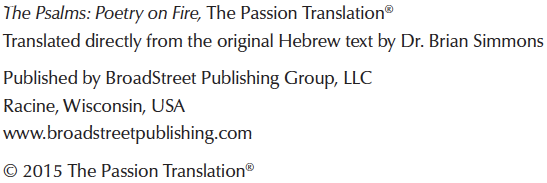
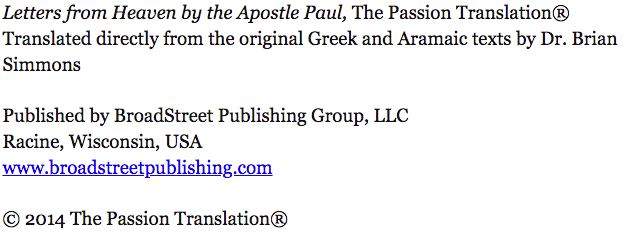

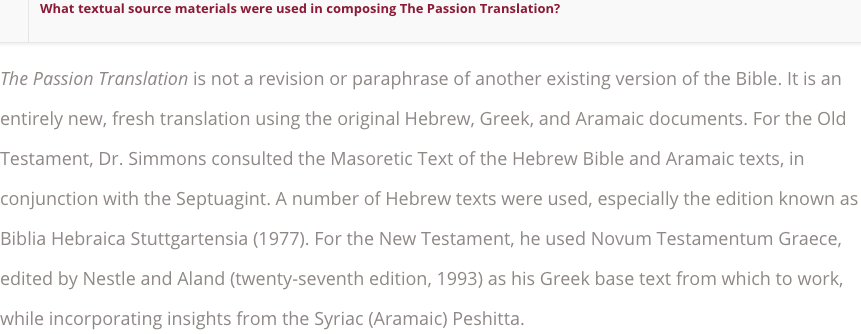

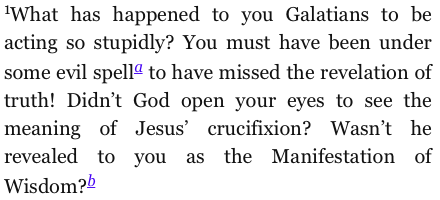
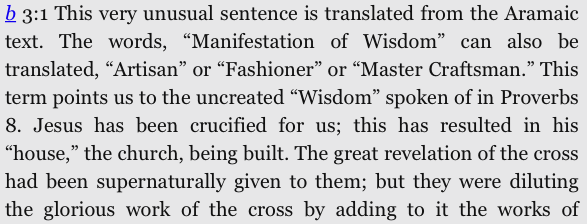
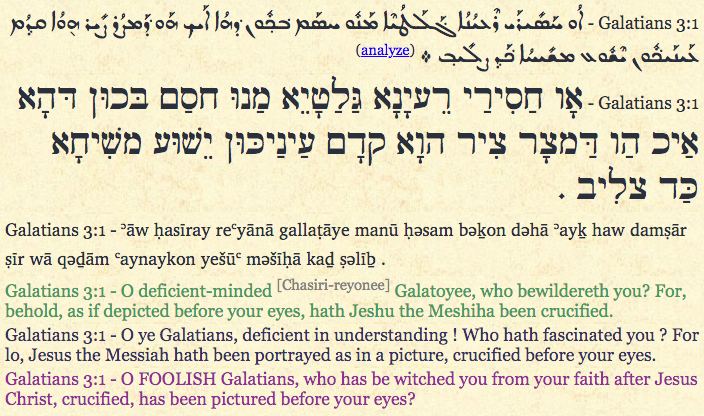
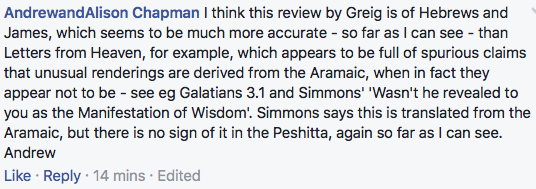
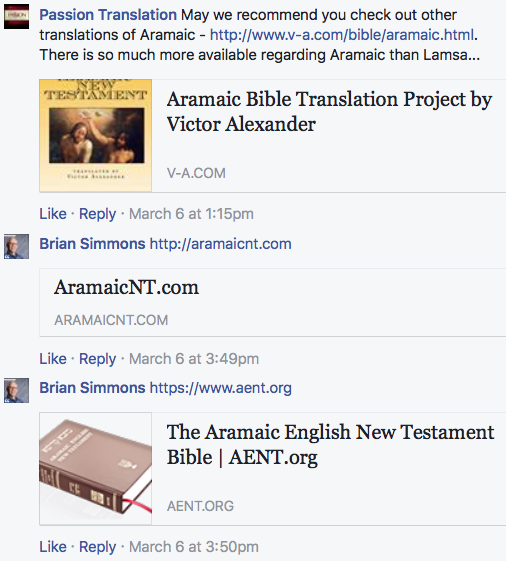
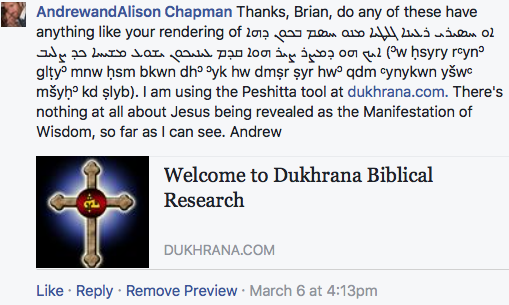
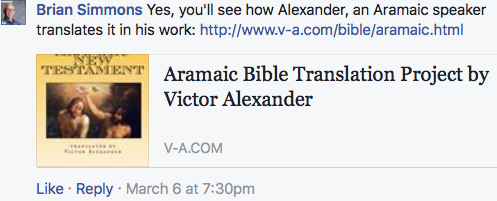


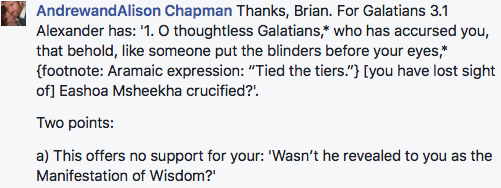




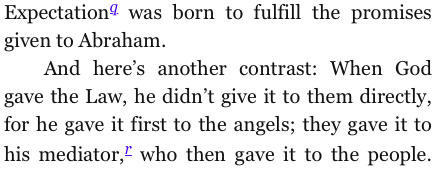




















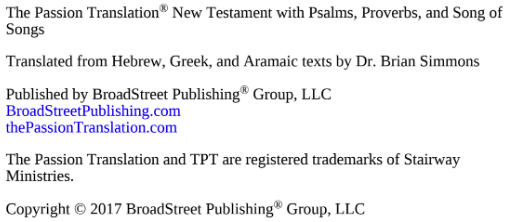

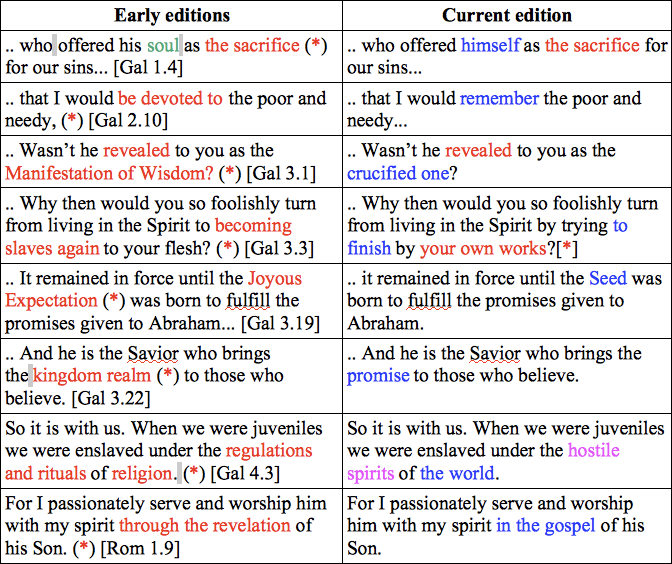


I have/had a concern about this “translation” from the cover and I am not a language scholar by any means. And I couldn’t quite put my finger on what concerned me as I read more and more. I knew nothing about the author and its origin until a few days ago and now i run across your very detailed post of june 19, 2020. (Thank you)I received the 2nd edition tpt from my sister who loves this bible. I was first concerned with footnotes in Revelation(where i started 🙂 ) but now I am almost finished with the whole NT and just started looking into the person, Brian Simmons…i was surprised that there was not a team of translators but just one person. And after finding the interesting testimony of Simmons and now your concerns…
Would you please indicate to me the concern you have, asyming you are concerned, why the average Christian, reader and lover of God’s Word, might be cautioned about reading this bible…. Thank you, a sister in the Lord
Hi Vicki, sorry just found your comment, it seems I haven’t been receiving notifications of comments, sadly.
You might like to look at this one also: https://theriveroflife.com/2017/11/29/is-the-passion-translation-actually-a-translation-at-all/
He is reported as saying in an interview that he had little background in the biblical languages, and I have argued that he is not translating at all, but rather using English translations, and altering them.
Many of the changes he makes cannot be justified, that is, the original Greek or Hebrew text cannot mean what he claims it means.
I have demonstrated that many of the changes came from Victor Alexander’s bible. He is a film-maker who is interested in the boundary between dream and reality. He claimed to be translating from an ancient Aramaic manuscript, but provided no evidence that it even existed at all! Have a look at the latter part of this article to learn more about Victor: https://theriveroflife.com/2017/03/19/brian-simmons-sid-roth-the-passion-anti-translation-and-ephesians-5-22-submit-or-be-tenderly-devoted/
Andrew